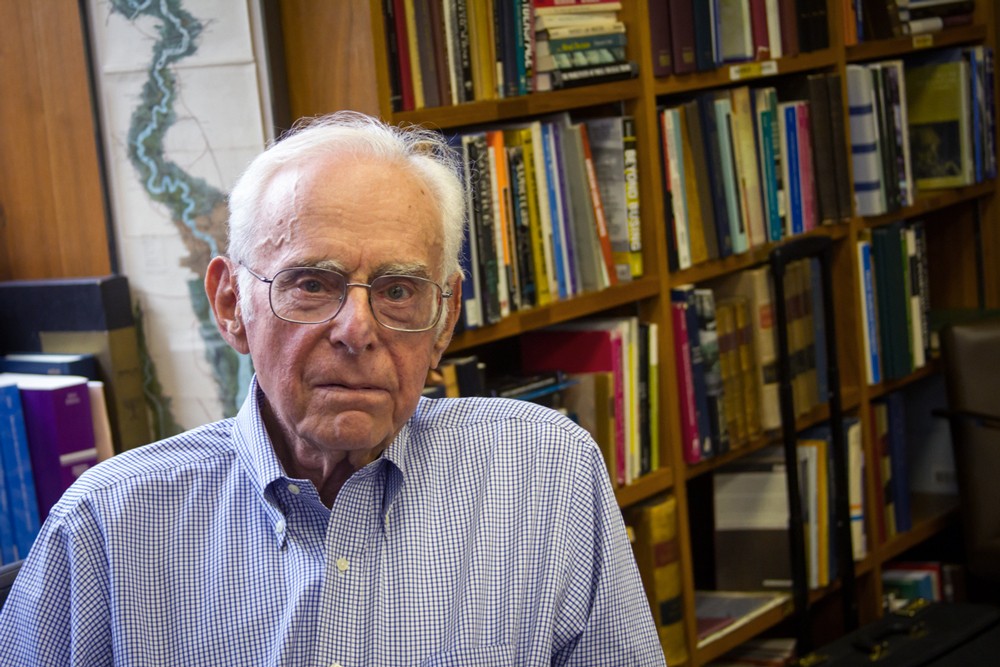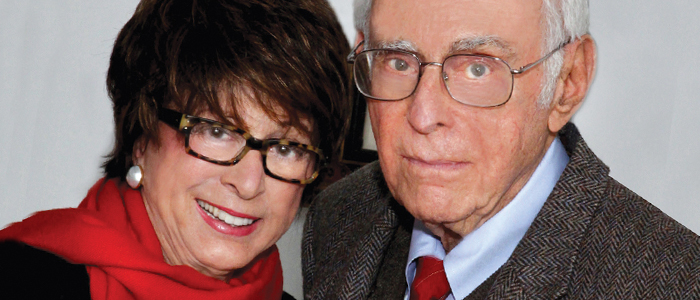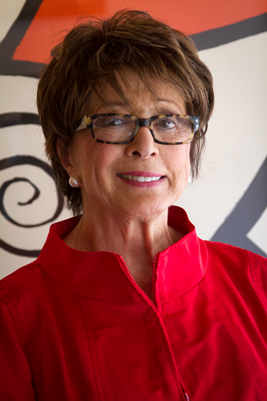What does it mean to be a social activist?
Befitting a community leader of his stature — with the distinction of being the oldest active federal judge in Michigan – U.S. District Judge Avern Cohn is measured and thoughtful, yet surprisingly blunt in his answer, “Activist is a loaded word, but I think it means to do more than simply sit on your fanny.”
Meeting Judge Cohn for the first time in his chambers can be unsettling, particularly to those unprepared for his stern demeanor, mental agility and sly humor. At his desk, amidst his venerable collection of books, photos, historical documents and memorabilia reflecting his life’s work in the practice of law, one finds him most welcoming. In chatting with Avern’s wife, Lois Pincus Cohn, we also get a rare glimpse into the couple’s journey together and what it means to them to be the recipients of the 2014 Activist Award from the Jewish Community Relations Council (JCRC.)

Going strong at 90, with a long history of activity in numerous political, secular and Jewish organizations, Avern still manages a full caseload. Lois is equally active in the public arena with a professional life that has spanned the fields of education, public television, politics and the arts. For the past 29 years, she has been proprietor of ARTSPACE, a Birmingham gallery that specializes in reselling fine art to collectors, museums and corporations.
Together, and each in their own capacities, Avern and Lois have enjoyed a long history of achievement, activism and philanthropy, giving generously of their time and energy to benefit the community, the region and beyond. As the recipients of the 2014 JCRC Activist Award, they will be honored at a special event on Sunday, June 22, at Adat Shalom Synagogue in Farmington Hills.
On Milestones in Careers
myJewishDetroit: Lois, thinking back on your journey in public service, what projects have been nearest and dearest to your heart?
Lois: My beginnings! I began as a suburban wife and mother doing some substitute teaching in a local school where I had taught previously. I got my community start with a radio commentator named Lou Gordon. Lou was a family friend and I loved his muckraking, Lincoln Steffens style of reporting. One day, we were out for dinner with Lou when he asked me, “How would you like to be my gumshoe?” I said, “What’s that?” And he said, “Why don’t you do some background work on my reporting on the radio show,” and that’s what got me started. That job got me into the community, taught me how to talk to people, made me think critically. I became involved politically, began to understand people’s motivations and how things work. It was very exciting work that really opened my mind to a life of thinking about social and political issues.
Then I worked at Wayne State University which led to my appointment as coordinator of the first Public Defender Office in Detroit. With that background, I started my own TV talk show on Detroit Public Television and became the producer and moderator of a weekly program called “Newsmaker.” I kept that show going for ten years. Believe it or not, I was very shy, but I loved meeting people. And the experiences! I should write them down one day.
myJewishDetroit: Avern, as you reflect on your life’s work in the practice of law and social justice, what projects have been the most enjoyable or satisfying for you?
Avern: Once I became a judge, I stopped saying I “enjoy” my work. Because, by definition, some of the things I do as a judge hurt people.
It’s not for me to say, but I’ve been told that I’ve done a fairly good job of judging. Some people don’t think so – because, in almost every case, there is, in common language, a “winner” and, in common language, a “loser.”
What I say is that I get a lot of satisfaction in what I do. I suppose out of the 60 some years in my career, I’ve gotten the most satisfaction out of being a judge. I’ve been a judge for 35 years. A very a long time. And I continue to get satisfaction out of it. Because it’s challenging, interesting work. And I feel that I am accomplishing something. Every day, in every case. From situation to situation, conflict to conflict, there’s something different to consider and weigh. And all of the cases involve some form of human dynamic interaction.
On Achievements
myJewishDetroit: Of all your achievements, what has made you the most proud?
Avern: I don’t try – and can’t really rate what I’ve accomplished as a judge and what I’ve accomplished before I became a judge. I’ve been fortunate to have had a variety of experiences. As far back as I can remember.
And, in some sense, there always has been a relationship — sometimes attenuated – but a relationship nonetheless between what I’ve accomplished and the fact that I’m Jewish.
I grew up in what I call the Golden Ghetto. I grew up in Northwest Detroit. Went to the Detroit Public Schools. I then went to the University of Michigan. My college education was interrupted for three years while I served in the United States Army, Fortunately, or otherwise, I was never given an assignment overseas. I came back from the Army – went to the University of Michigan Law School, began practicing law in the city of Detroit as my father did, which is something I always had looked forward to. And in a sense, my experience replicated that of my father – because he was born in Detroit, went to the Detroit Public Schools, then to the University of Michigan. I practiced law for 30 years, had a variety of experiences as a lawyer and had the good fortune to do work in both the Jewish community and the general community.
I worked in the public sector as chairman of both the Michigan Civil Rights Commission and the Detroit Board of Police Commissioners. I also served on the Michigan Social Welfare Commission. Those extracurricular activities also gave me a great deal of satisfaction.
I would add that when I came back to Detroit in 1949, the Junior Division of Federation was my first center of activity. Sometime in the early 50’s, I became a member of the executive committee of the Jewish Community Council (now the Jewish Community Relations Council). Council was the first organization where I was really active and it’s the organization in which I stayed longest, so today it’s especially pleasing to get an honor from that organization.
And of course, my activity in the Democratic Party didn’t hurt me in getting my appointment by President Carter as U.S. District Judge for the Eastern District of Michigan in 1979. For me, that’s been the brass ring on the merry-go-round.
myJewishDetroit: Lois, you’ve worked in so many fields – education, communications, arts and politics. Of all your steps along the way, what makes you proudest?
Lois: ARTSPACE. My gallery! Because I created it. And it’s mine, for better and for worse, through progress and problems. I think it’s a wonderful place. I began it in 1984, didn’t have much capital, but my sister had the concept and started a similar gallery in California. The entire inventory is on consignment, so all I really needed was to find a space and build it out. There’s something about having your own business, making the decisions, right or wrong, tough or not. I think that’s a really good feeling.
myJewishDetroit: Is there something you still dream of doing?
Lois: I have a wonderful project in mind for children in the city— but it’s too early to talk about it. At least publicly. In the meantime, I’m enjoying plugging my daughter Julie’s new book, Canvas Detroit, co-authored with Nicole Christian. The book is a beautifully designed volume that showcases the stunning breadth of artwork currently being done in the city.
And as many people know, I’m still an active Democrat. I write a lot of checks and lick a lot of envelopes.
myJewishDetroit: Avern,what is your primary focus today?
My caseload! I always have a variety of cases I’m working on. Every day or two, new cases are filed, so there are new disputes to settle – new situations to confront. Every day is different.
On the City of Detroit
myJewishDetroit: We live in interesting times, in an endlessly interesting city. What do you see in Detroit that gives you the most hope for the city’s future?
Lois: There’s what’s happening in Midtown and downtown. And there’s Dan Gilbert, of course. But in my view, Detroit is still a tale of two cities. One swipe of Woodward—wonderful! Go off the path – devastating.
Avern: There are a lot of great things going on in Detroit that point to a brighter future. But it’s going to be a different city. When I grew up, Detroit was a city of 1.2 million, it’s now 750,000. Today when you think of the future of Detroit, you have to think beyond the city limits to what a greater Detroit can be.
On Activism
myJewishDetroit: In your view, what does it mean to be a social activist?
Lois: It means recognizing how fortunate you are and giving back.
Avern: I think Oliver Wendell Holmes said it best, “A man shall share the action and passion of his times for fear not to have lived.”





